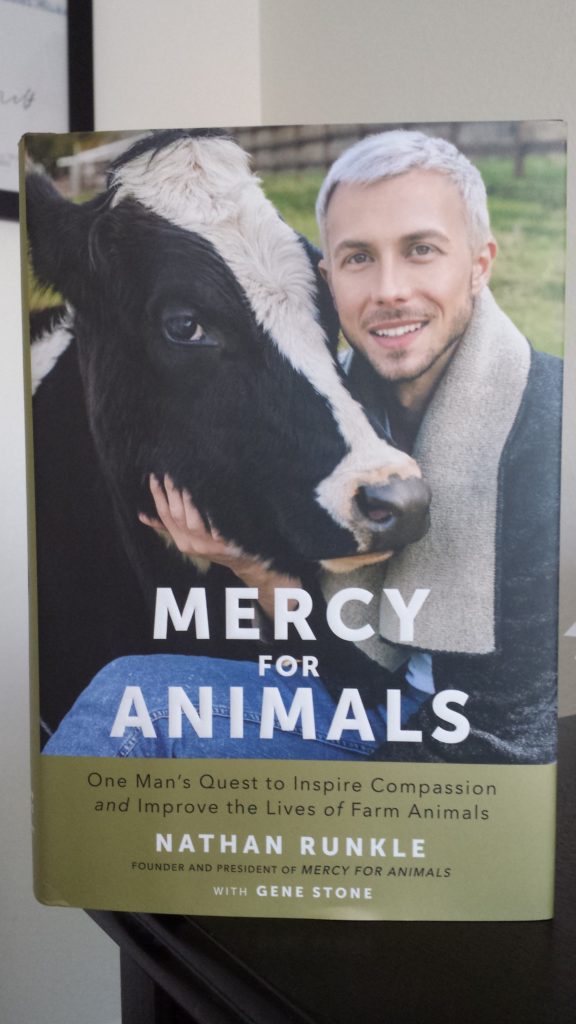
Wow. I’ll be honest; this book is not easy for animal lovers to read. But it’s SO important, you simply must.
MERCY FOR ANIMALS is a memoir – partly of Nathan Runkle, the founder, and partly of the organization of the same name and the movement in farm animal protection that it fostered.
This is the first book I’ve read about factory farming. I’ve heard of the horrors of it, but this is the first time they were presented so clearly and so thoroughly to me.
Runkle begins by talking about the farm where he grew up, which was in a small town in Ohio, actually pretty close to where my mom grew up. So I wasn’t unfamiliar with it. His small family farm, operated by his parents, is where he learned to love animals so. It reminded me of those in which country veterinarian James Herriot tends to animals, in his ALL CREATURES GREAT AND SMALL books. Those farmers care greatly about their animals – they have become friends, who are also responsible for the profitability of their business. These farmers wouldn’t think of hurting their animals, and they immediately call the doctor when something’s wrong. This is the idyllic life I would love to believe still exists. Okay, not so much the eventual slaughter, but at least the treatment of the dairy cows and the egg-laying hens, and of the pigs during their lives.
Sadly, horribly, when factory farming took over, that system disappeared, only to be replaced with one where the owners of these huge football-field-sized operations allow their workers to treat animals as inanimate objects at best, objects of animosity and even hatred at worst.
The book provides background on several of the organization’s early investigators, who bravely (because I know I could NEVER have gone through what they did) conducted all-out Upton Sinclair-esque examinations of the farms. Dairy farms, pig farms, and chicken and turkey houses are all included. What the investigators saw and documented – via a hidden camera – and eventually presented to law enforcement and the media, are laid out. It’s painful to think about, or write about. Animals are beaten to death regularly, sometimes because they’re ill from lying in manure and cramped conditions, sometimes because they’re not needed (male chicks in egg farms, calves in dairy farms where the female cows need to be kept continuously pregnant to produce milk, etc.), and sometimes for no real reason – or because badly treated workers need to take out their frustration on someone. I don’t want to go on, but suffice it to say, this is an immensely educational, eye-opening book that everyone who wants to know where their food comes should read.
Its last chapters end on a positive note: clean meat. I didn’t know anything about this either, but big-time investors like Bill Gates and Richard Branson are backing young, brilliant, forward-thinking scientists who are striving to create actual meat – not vegetarian alternatives but real meat – from stem cells. With the world population increasing at the rate it is, there’s no way we’ll have enough land to continue to farm animals this way into the future. So clean meat will not only prevent the killing of approximately 10 billion animals per year, but is crucial to sustaining the planet.
I am so thankful to Runkle for exposing this all to me, and to Changing Hands bookstore for hosting his reading (which is where I learned of the book and met him). As I said above, it’s a difficult book to read, but incredibly important and necessary for anyone who wants to know what is going on in our world.
